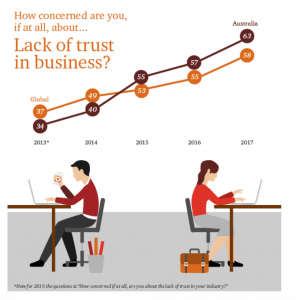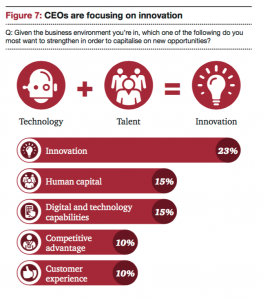By Keith Dugdale and Ben Paul
All images are sourced from the 20th PwC CEO Survey.
If you’re still on the fence about whether trust is important in business or not, the latest results from the PwC 20th CEO Survey should help to clear a few things up.
20 years ago, when the survey first started, PwC didn’t even measure CEO’s sentiments about trust in business. Trust first appeared in the 2002 survey, when a mere 12% of CEOs reported that trust in business was declining.
Fast track to 2013, after the business world has been tossed around by the Global Financial Crisis, and that number more than tripled. In 2013, 37% of CEOs stated that they were concerned about a lack of trust in business. But what is really interesting to us, is how much that number has grown in the past three years.
In this latest survey, 58% of CEOs globally stated that they are concerned about a lack of trust in business. And for our Australian readers, that number climbs to 63%. Good news, however, for our New Zealand readers, where it was only 41%. Clearly they are doing something differently when it comes to trust in business. But what can it be, and should we really care?
Should we care that lack of trust in business is on the rise?
Well, yes, although I guess you all new we would say that since we live and breathe all things trust. But when it comes to the outcomes of this survey, here is a small indication of why this decline in trust is important.
Compared to Australia and the rest of the world, New Zealand CEOs are less likely to believe that a lack of trust will harm their business. And they also believe (72% of them at least) that their businesses will grow through Joint Ventures or Strategic Alliances (compared to 48% globally). To us, these two sentiments are intrinsically connected. If trust is an issue, the likelihood of you being open to and entering into strategic alliances and joint ventures, or others wanting to partner with you, is much more limited as by their nature these forms of partnerships are inherently based on trust.
So if your organisation has a trust issue – either internally or externally – and is not perceived as trustworthy, you are going to potentially limit your organisations options for growth.
The impact of technology on trust
A significant focus of the report is actually on the link between technology and trust, with the survey discovering that the more that an organisation uses technology to sell to or engage with a customer, the harder it will be to maintain trust. Indeed, in New Zealand as an example, 72% of CEOs report that it is harder to gain and keep trust in an increasingly digital world.
This is because technology not only removes the human interface, it signals that the provider is focused on process efficiency as a differentiator in order to keep costs (and price) down. That means there may be other things happening within the provider organisation that makes human interaction harder.
To us, this signals that building trust between people, particularly in the sales process, is more important than ever. Particularly when technology fails– if you have a data breach, or the technology crashes and customers are left stranded, or things just don’t work as efficiently as customers want them to. In these instance, if you’ve only built trust through your technology, you are going to be in a world of pain.
And as more and more companies focus on using technology to increase sales process efficiencies, it could become your real differentiator in a competitive market.
Can you ever really trust technology?
It seems that some of the views of CEOs around technology and trust are driven by whether the technology is deemed trustworthy. Sorry, but in our world, no matter how good a piece of technology is, it can rarely build trust. If you analyse it against the Trust Equation by Maister et al, you’ll see why we think that:
Credibility: Your piece of technology can have great credibility. Others have used it, and it’s worked and it’s helped them. Technology can be credible.
Reliability: It may even do the tasks that is says it’s going to do. You may even be able to depend on it to help run your business processes day in and day out. I (Keith) would definitely say “may” here based on my own bitter and painful tussles with technology. But if it fails or crashes? Your reliability will plummet.
Intimacy: Forget it. You can’t teach systems to truly care about and understand a person’s world. A system or piece of tech simply cannot understand what’s important to an individual and what their future aspirations are. At least, not yet!
You may believe that you have some credible and reliable software but without any intimacy, you can’t have a trusted relationship with technology. So as businesses, we cannot rely on our technology tools to build trusted relationships with our clients and customers.
Should there be a greater focus on customer experience?
Given the focus on technology, it’s not surprising in many ways to see that 23% of CEOs want to strengthen their capabilities in Innovation, and 15% in Digital and technology capabilities, but only 10% want to strengthen their customer experience.
But if trust is so critical, and we know that trust cannot be established by technology alone, is this focus right?
Certainly, innovation is critical in business as we seek to find new and better ways of doing things that will beneft our customers. But so is being reliable and intimate with our customers. And we can’t help but reflect on the comment from a client of an engineering firm we recently interviewed who told us that ‘I just wish they would do what they say they are going to do. I don’t need them to go above and beyond. Just deliver exactly what you promised, on time, and I’ll be happy.’
To them, innovation and technology come a definite second priority to the customer experience. So, we encourage CEOs to not lose sight of the basics when it comes to building trust and giving clients and customers a great experience. Sometimes it’s the simple things that have the most impact.
Got a comment? Join in the conversation over on our LinkedIn post.




